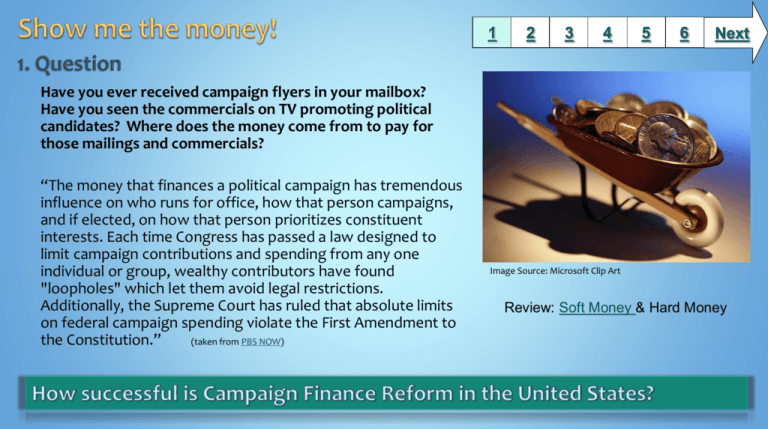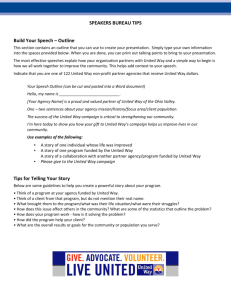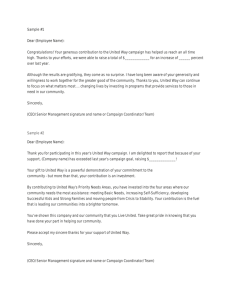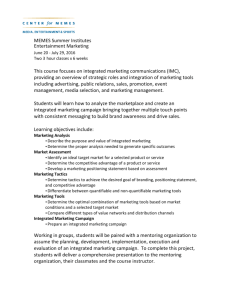
1
2
3
4
5
6
Next
Have you ever received campaign flyers in your mailbox?
Have you seen the commercials on TV promoting political
candidates? Where does the money come from to pay for
those mailings and commercials?
“The money that finances a political campaign has tremendous
influence on who runs for office, how that person campaigns,
and if elected, on how that person prioritizes constituent
interests. Each time Congress has passed a law designed to
limit campaign contributions and spending from any one
individual or group, wealthy contributors have found
"loopholes" which let them avoid legal restrictions.
Additionally, the Supreme Court has ruled that absolute limits
on federal campaign spending violate the First Amendment to
the Constitution.”
(taken from PBS NOW)
Image Source: Microsoft Clip Art
Review: Soft Money & Hard Money
1
2
3
4
5
6
Next
Research the history of Campaign Finance Reform in the United States. Use
either Cornell Notes or a web 2.0 tool of your choice to record your
research.
General
Information about
Campaign Finance
Reform
Campaign
Finance –
1970’s
Campaign Finance
early 2000’s (sources
listed in
chronological order)
Campaign Finance –
2008 to now
(sources listed in
chronological order)
•A Century of U.S.
Campaign Finance Law
•FEC - A Short
History
•NBC Learn – Obama
Rejects Public Financing
•Federal Election
Commission Campaign Finance
Disclosure Portal
•Buckley v.
Valeo
•NBC Learn – McCain
Discusses Supreme
Court Ruling on
Campaign Finance
Reform (2003)
•ACLU – Campaign
Finance Reform
•Votesmart.org
Campaign Finance
portal
•McConnell v. Federal
Election Commission
•AZ Free Enterprise Club
Freedom Club PAC v.
Bennett
•NBC Learn – Super
PAC’s Raise Millions in
GOP Race
•NBC Learn – President
Obama Criticized for
Ties to Lucrative Nonprofit
Image Source: ACLU Campaign Finance Reform
1
2
3
4
5
Check the Campaign Finance Files!
1.
2.
Use the PBS Campaign Finance Files to uncover internal
documents from the Democratic and Republican party
officials in showing how financing could influence policy.
Read at least 4 artifacts and summarize using this
organizer or shutterb.org and make sure to choose from
both of the political parties.
Should the government limit spending on Campaigns
or will limiting spending infringe upon first amendment
rights?
1. Laws Shouldn’t Supersede Free Speech
2. Secret Campaign Funding Corrupts and Endangers Democracy
Read each of the links and add to your organizer the Procampaign finance reform and Anti-campaign finance
reform platforms.
Image Source: Opensecrets.org
6
Next
1
2
3
4
5
Use your notes to create a Prezi to answer the
essential question:
How successful is Campaign Finance Reform
in the United States?
Be sure to include the following in your Prezi:
General overview of Campaign finance reform from 1970’s-today
Controversies involving Campaigns by both major political parties
Debate over the effectiveness of Campaign finance reform in the
United States
Your personal opinion of Campaign finance reform based on your
research
Refer to the following rubric to earn an A!
Image Source: clipart.com
6
Next
1
Practice for the AP
Government test –
Answer one of the
following questions
Question 4 from the
2000 AP test
Question 4 from the
2005 AP test
2
3
4
5
6
Next
Interested to see who wants reform in campaigns?
Campaign Finance Organizations/Resources
Create a social media strategy for one of these
organizations to increase awareness/influence of their
cause in America.
Are these organizations using Social Media?
What forms of Social Media would this organization use to spread their
message?
Can you contact someone from this organization to share your ideas?
1
BCPS Curriculum
Unit 3 – Linkage Institutions Indicator 2: Students will analyze the influence of the electoral system in order to evaluate the impact
on the political process (III – A4-5) Objective 4: Evaluate the success of campaign reform legislation.
Maryland State Curriculum
1.1 The student will demonstrate understanding of the structure and functions of government and politics in the United States.
Indicator 1.1.2 The student will evaluate how the principles of government assist or impede the functioning of government. 1.1.4 The
student will explain roles and analyze strategies individuals or groups may use to initiate change in governmental policy and
institutions.
Common Core State Standards
CCSS.ELA-Literacy.RH.9-10.1 Cite specific textual evidence to support analysis of primary and secondary sources, attending to such
features as the date and origin of the information.
CCSS.ELA-Literacy.RH.9-10.3 Analyze in detail a series of events described in a text; determine whether earlier events caused later
ones or simply preceded them.
CCSS.ELA-Literacy.RH.9-10.9 Compare and contrast treatments of the same topic in several primary and secondary sources.
CCSS.ELA-Literacy.WHST.9-10.2 Write informative/explanatory texts, including the narration of historical events, scientific
procedures/ experiments, or technical processes.
CCSS.ELA-Literacy.WHST.9-10.6 Use technology, including the Internet, to produce, publish, and update individual or shared writing
products, taking advantage of technology’s capacity to link to other information and to display information flexibly and dynamically.
CCSS.ELA-Literacy.WHST.9-10.7 Conduct short as well as more sustained research projects to answer a question (including a selfgenerated question) or solve a problem; narrow or broaden the inquiry when appropriate; synthesize multiple sources on the
subject, demonstrating understanding of the subject under investigation.
Standards for the 21st Century Learner
1.1.6 Read, view, and listen for information presented in any format (e.g. textual, visual, media, digital) in order to make inferences
and gather meaning.
2.1.3 Use strategies to draw conclusions from information and apply knowledge to curricular areas, real-world situations, and
further investigations.
Maryland Technology Literacy Standards for Students
3.0: Use a variety of technologies for learning and collaboration.
2
3
4
5
6
Time Frame: 2 90 minute class periods
Differentiation: Each graphic organizer can be created by
the students - does not need to use the provided
resources. Databases have text-to-speech features
for some articles.
Learning Styles: Field Dependent, Field Independent,
Visual, Auditory, Tactile, Reflective, Global
AVID Strategies:
inquiry based learning, Cornell notes
Notes to the teacher:
Consult with your School Library Media Specialist to
implement this Slam Dunk Lesson.
On slide 3, the graphic organizer is linked, or the
students may use shutterb.org (do not need a login or
email to use).
Teacher will need to create a Prezi login (best to
create one for the entire class).
On slide 3, the link to the Gale article may require a
login. See your Library Media Specialist for passwords.
Last updated: July 2013
Created by Jamie Higgins Shaull, Department Chair – Social Studies/Library Media Intern
BCPS Slam Dunk Research Model, Copyright 2013, Baltimore County Public Schools, MD, all rights reserved. The models may be used for educational, non-profit school use only.
All other uses, transmissions, and duplications are prohibited unless permission is granted expressly. This lesson is based on Jamie McKenzie’s Slam Dunk Lesson module.







